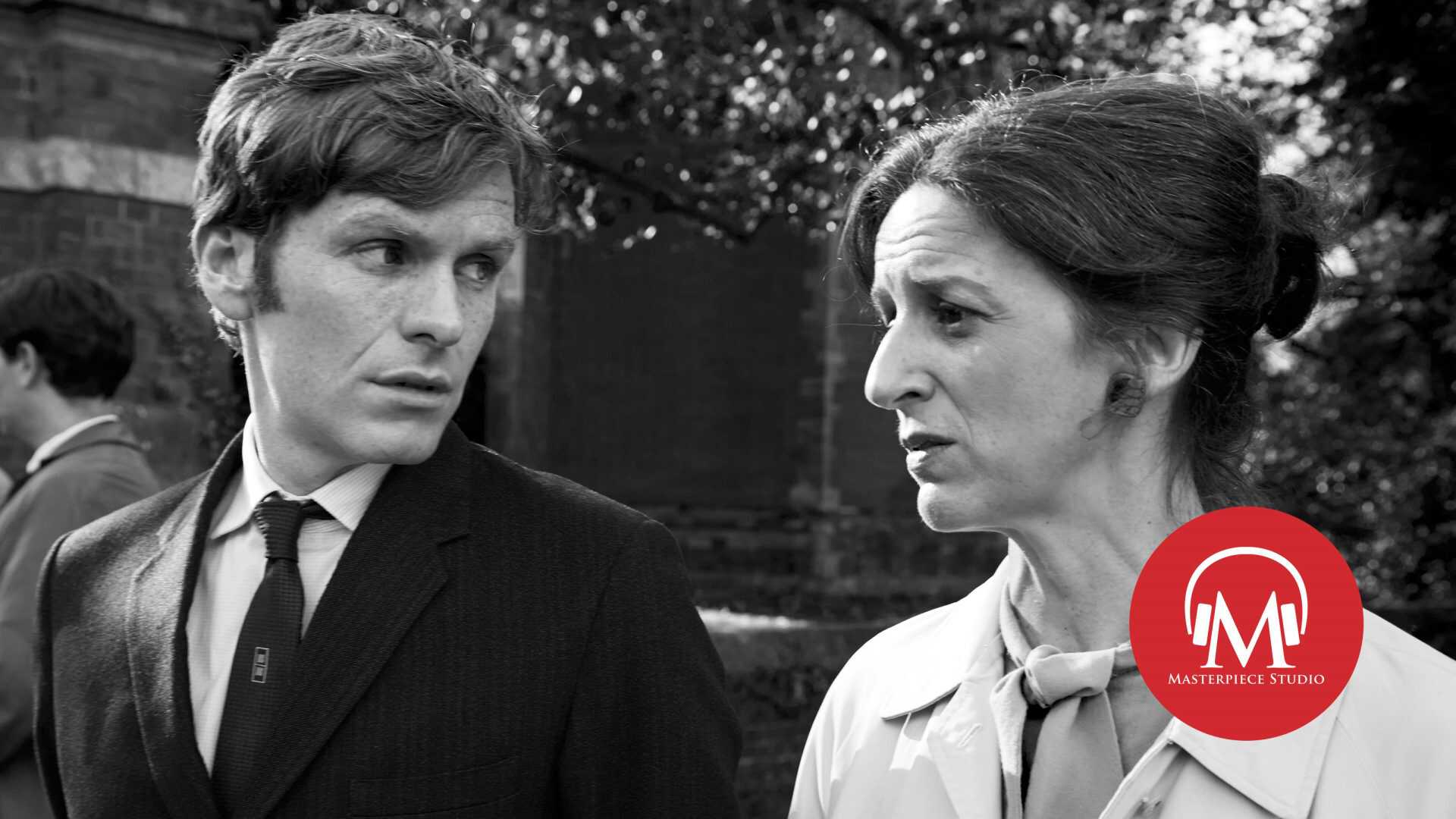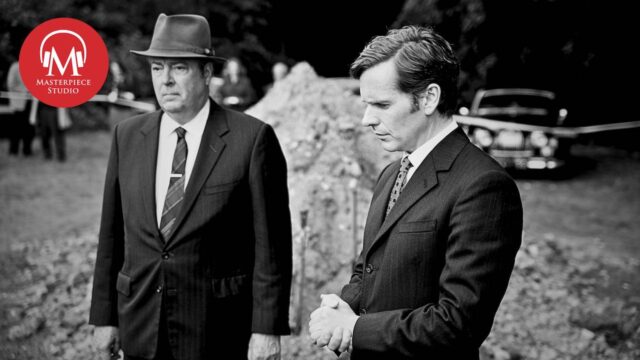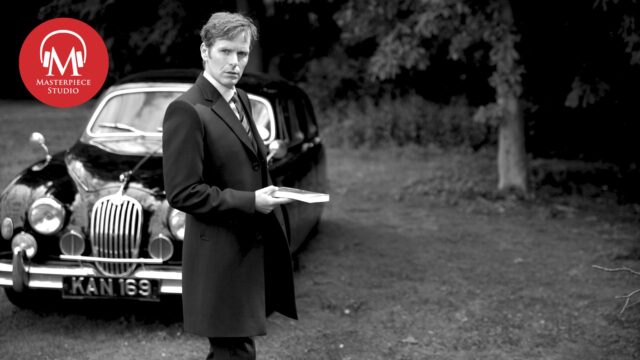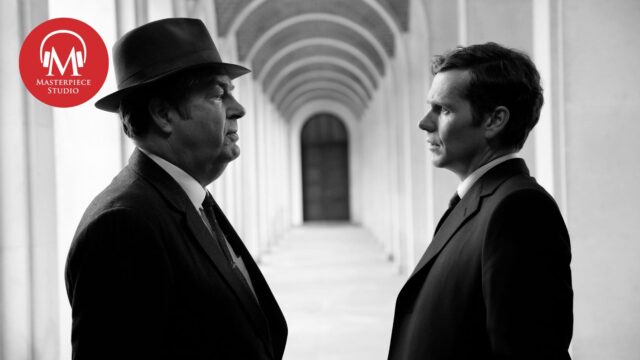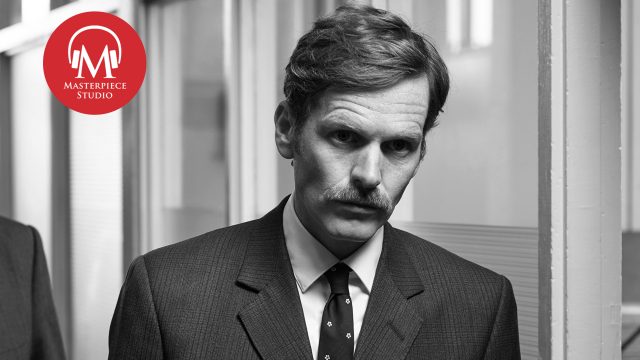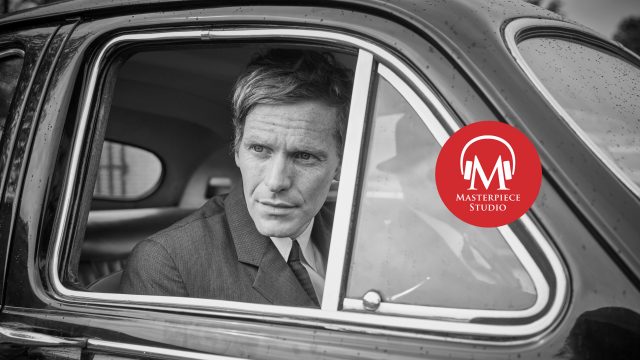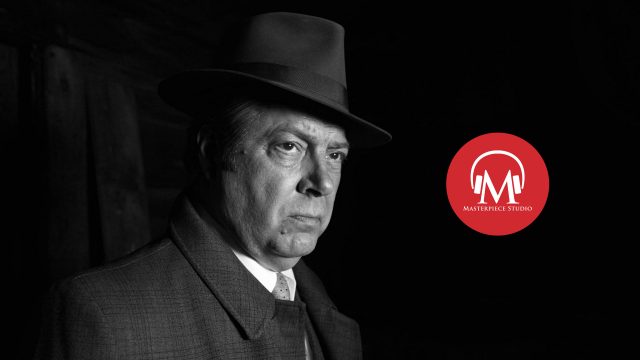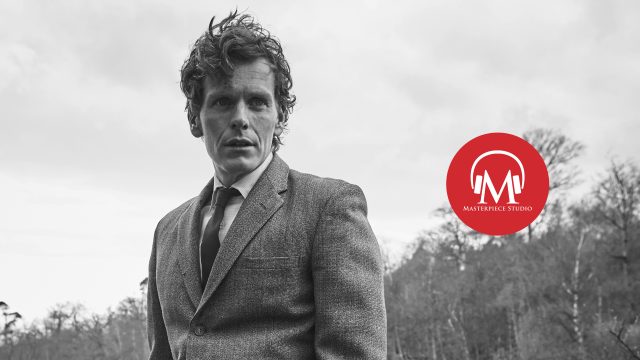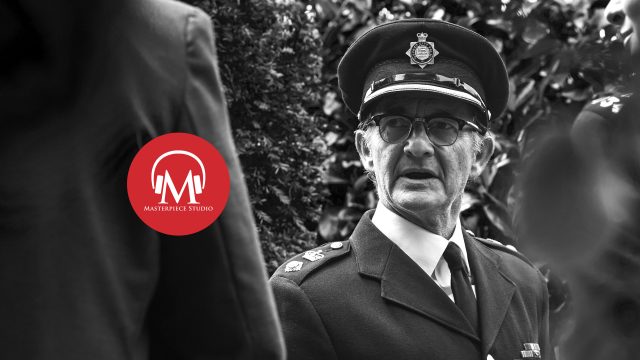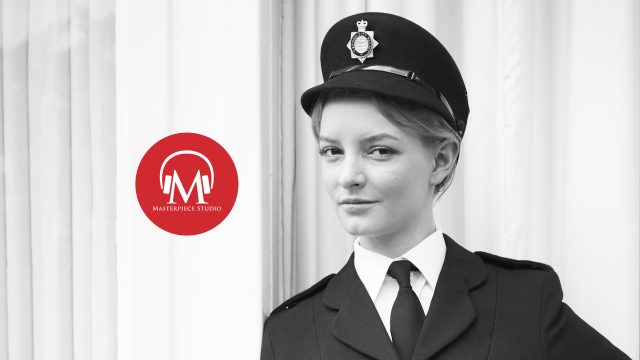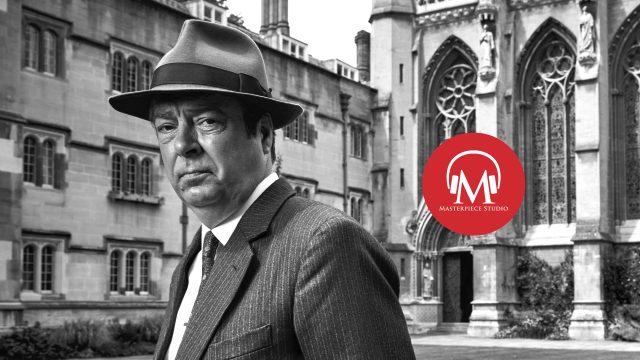Jace Lacob (Jace): MASTERPIECE Studio is brought to you by Audible. For a free trial, go to Audible.com/Masterpiece.
I’m Jace Lacob and you’re listening to MASTERPIECE Studio.
Though Inspector Morse was not always an ideal policeman, actor John Thaw was always an ideal Inspector Morse.
For 13 years, John Thaw brought the hard-drinking, sarcastic, and somewhat snobbish detective inspector to life on the screen.
John Thaw died in 2002, just two years after his character, Morse, died in the show’s series finale. Still, Inspector Morse’s legacy lives on through the spinoff shows Lewis — which follows Morse’s longtime partner — and Endeavour — a Morse prequel.
At the same time, John Thaw’s legacy lives on through his daughter Abigail, who followed in her father’s footsteps to become an actor.
CLIP:
Abigail Thaw: He was really prolific, so and I was thinking, “How the hell am I going to make my own way?”
Jace: Beyond acting chops, Abigail Thaw shares her dad’s surname and his penchant for playing characters that break the mold.
For Abigail, that includes the role of Dorothea Frazil, a woman who runs a newspaper and helps a young detective get to the bottom of crimes in the 1960s. The young detective’s name?…Endeavour Morse.
We caught up with Abigail Thaw just before the third season premiere of Endeavour to learn more about Dorothea and what it’s like to carry on the Morse legacy her father left behind.
Jace: Welcome, Abigail.
Abigail Thaw (Abigail): Hi, thank you.
Jace: What was your reaction when you received the call about doing a cameo in Endeavour, and how did Russell Lewis persuade you to take on the role of Dorothea?
Abigail: (Laughs) He didn’t have to persuade me, my goodness. I believe — gosh it was a while ago now — but I think the way round was my agent was calling me about finding a young John Thaw, or somebody who could possibly be a young Morse, and “Did I just happen to know anyone?” you know, being an actor.
And I couldn’t think of anyone, actually. My mind sort of went blank. Anyway, I said, “What do you mean? Well, you know, you can’t possibly be doing the spin-off. What? What?”
And she said, “Yeah.”
So I said, “Well, for goodness sake, I’ll do anything. I’ll do a walk-on. I’ll sit behind a desk. I’ll be the sergeant, and you know that’ll be it, but I’d love to be involved in someway. It’d be really good fun.”
And then, the next thing I knew, I got a call, yeah, and a lovely email from Russell saying, “Would I do this part, Dorothea?” So I did, and of course, Shaun, by this time, was cast and it was absolutely perfect, and it still continues to go on. So it’s wonderful, yeah.
Jace: Did you feel any trepidation about the show initially? Given the legacy of Inspector Morse.
Abigail: Oh, sure. Yeah, of course.
I mean as I said, I thought, “You can’t possibly! You can’t do another Morse! What would Dad think?” And then, I thought about it and I just thought, “Well, actually I think he’d be really approving,” because it’s a very different era, a very different animal from the original Morse, and it’s just rather wonderful that people still want to see it in all of its forms. And, I feel really proud. I really do, actually.
Jace: Along those lines, there, there were, as you said, sort of several people behind the scenes of Endeavour, who had worked on Morse, what was it like setting foot on the set that first day?
Abigail: I mean I could say nerve-racking, although I did actually go in a bit earlier and met costume and makeup and stuff, and it just felt like a bit of fun. If I’m really honest, I’ve been a lot more nervous since then.
But just that first day was … I was actually more worried for Shaun. I realized what huge boots he was putting on, and I didn’t want him to feel, I don’t want to say overwhelmed, but sort of oppressed by the daughter of this, you know, this guy that he was supposed to be continuing on, you know?
Not that he has ever imitated him, but I didn’t want to be the person to come on and say, “Well, he would have never done it like that. Dad would never done it like that, and what on earth do you think you’re doing?” you know, he’s always said that he didn’t watch any of them, and he wasn’t interested in just impersonating John Thaw; quite rightly so.
Jace: What do you think your father would have made of you following in his footsteps as it were and involving yourself in the slew of fictional crimes and murders in Oxford?
Abigail: You see, as I said before, I think he’d love it. I think he’d be laughing.
I’ve just been filming in Oxford actually last week, and when you’re traveling through the town, it’s still got an awful lot of sort of Morse memorabilia: you get a lot of sort of tour buses and the hotel has a “Morse bar.” You know, there’s a lot of stuff about Morse in Oxford, so I can’t help but think of him a lot when I’m there.
I think he’d give it his blessing. I think he’d love it. I think, “Yeah. Go on, kid. Have a good time.”
Jace: Aw. In the very first episode of Endeavour, you and Shaun Evans share a scene where Morse visits Dorothea at the Oxford mail offices and there’s a very sly tip of the hat to your father.
CLIP:
Abigail Thaw: What did you say your name was?
Morse: Morse. Why?
Abigail: Have we met?
Morse: I don’t think so.
Abigail: Another life then.
Jace: What was it like shooting that scene, and how emotional was it on that day?
Abigail: It wasn’t like, you know, breaking down in tears and that kind of sentimentality. It was just, it was as you said, a nod. It was a nod to him. It was, “Hello,” yeah…
Jace: Now this… It was originally meant to be a very small cameo, but Dorothea has since become a recurring character on Endeavour. Has this surprised you?
Abigail: Yeah! Yeah. I’m thrilled. Absolutely thrilled. I love Dorothea. I think she’s terrific, and you know, you need some more women. So yeah, I’m thrilled.
Jace: Now Shaun’s performance is very, very different from your father’s, but do you ever see him doing anything physical that reminds you of John?
Abigail: I have to say, I know you’d probably want me say, “Yes,” but no. No! It’s really hard…And I think I probably…Ilike it that way because it keeps it very separate. I think if every time I walked on set and saw my father, I’d probably have a nervous breakdown, so I wouldn’t be able to do my job, you know?
And Dorothea’s relationship with Morse is a very separate thing. I think if I went around feeling, “Yes, I have this sort of underlying relationship with my father here,” it would be very weird.
Jace: That would be very, very odd.
How would you categorize the dynamic between Morse and Dorothea? They both appear to be outsiders of a sort. Are they linked by that separateness in a way?
Abigail: Yeah, I think both sort of loners and completely obsessed with their work, their job. They come at it from very unusual angles. You know, Morse is not somebody who would– you would have thought would become a detective. And Dorothea, as a woman in the 60s, you would not think would be running the newspaper, the city newspaper. So, they are kind of out of sync with their surroundings. They’re both ahead of their time and both very lonely because of that, because of their need for their work, their determination to be good at their jobs.
CLIP:
Dorothea: And when was this?
Morse: July…
Dorothea: That shouldn’t be…
Morse: …1866.
Dorothea: I’ve been at the Mail a while, Morse, but that’s before even my time.
Morse: This pre-dates the Mail. You’ll need to look in Jackson’s Oxford Journal.
Dorothea: Will I? Mm-hm.
Dorothea: You run me to earth here on a Sunday to ask me about a 100-year-old case?
Abigail: It’s funny actually because I think with Dorothea, you know, she’s older, so she’s more stuck in the 50s. And I…Every time I get a glance of myself in a reflection, I see my grandmother.
I was thinking how different it must have been, and I never appreciated this before with the women who…All of the actresses, some very young actresses are in mini skirts and flowing hair and I’m sort of trust, you know? And the hair spray…And it really is an insight into that– how strange that must have been for women anyway, and probably men, how different those late 60s were, where the fashion changed so radically to mini skirts, and bare legs, and freedom, and the pill and, you know…from the generation before.
Jace: I mean the show itself is very much pointed at the future.
There’s a brilliant moment in the pilot episode when Endeavour is driving a Jaguar, and he looks in the rear view mirror, and your father, John Thaw, looks back at him, a sign of his life to come of his future. What did you make of that moment?
Abigail: Well, it was very…That was the bit that really got me, actually, just watching it, yeah. And when we had the screening of it, and I knew it was there and I knew it was coming, but just hearing the music — Barrington’s extraordinary music — and then seeing Dad’s eyes peering from the rear window is just…Oh my god, yeah. Really…very, very emotional, yeah.
Jace: I get misty watching it, so I can only imagine.
Abigail: Yeah.
Jace: Now you never visited your father on the set of Morse, but I’m wondering what kind of stories he shared with you about the production?
Abigail: Well I know that people always assume — maybe we’re an unusual family in that — but we didn’t really ever…We didn’t talk shop very much. We kept that very separate. I mean, we would, you know, say, “Oh I worked with so and so, and he sends his love.” Or “Oh, he’s a good actor. What do you think of that?”
Normally, he wanted to hear stories about me, if I’m honest, and in my sort of youthful selfishness I would go on and on about myself and wasn’t that interested in what he was doing.
He was just you know, Dad.
I mean the funny…The one, you know, ironic thing was though, he never really felt, in the early days when he took on Morse, that he had a grip on the character. I think he felt quite lost. So he did mention that a few times.
Jace: You would never know that.
Abigail: I know. Funny…
Jace: He didn’t ever seem at sea with that character.
Abigail: Yeah, well I think it was just at the, you know, at the very beginning.
And of course at the end, you know, we all watched as a family. We had a big dinner around it, my sisters, and watched the final episode, which was terribly sad. So, it was never…no great insights I’m afraid.
Jace: I had read that you once auditioned for a role on Morse, that of a killer, I believe, but you didn’t get the part. Did you ever tell your father about your experience?
Abigail: I did, but only afterwards.
Anyway, I sort of went in and didn’t tell him, being incredibly proud. You know, “I’m going to tell him. I’m going to get this off my own bat, you know, my own merit.”
Although, I kind of think he must have known…How could he not have known? But maybe they were being terribly discreet and not telling him, I don’t know. Anyway, deeply, deeply humiliating to not get the part.
Jace: How supportive was your father about your decision to become an actor? Did he offer you any advice or encouragement or…?
Abigail: Well, in all honesty, I think he was rather disappointed. And funny enough, he always wanted to me to be a journalist, so here I am…
Jace: Playing a journalist.
Abigail: …In fact, I don’t even know if I told Russell that. That was one of his big things: a musician or a journalist, all the things I want for my daughters. You just don’t want your child to be rejected in any way at all, do you? You just want happiness and contentment, and it can be quite tough, quite tough business, but as soon as it was obvious that I’d made that decision, he was always very supportive, came to see everything. Always loved everything.
Jace: Turning our attention back to Dorothea, over the past 3 seasons and moving into this fourth one that you’re filming now, how do you see her as a character? What’s your take on Dorothea?
Abigail: Well, that’s not really for me to say, it’s for the writer, but you know, I love Dorothea’s humor. I mean, Shaun and I have a really good time on set, and I think that Russell has picked up on that relationship and has given us a lot more of that humor, and sort of recognizing the sort of lonely, old souls in each other.
You know, she’s troubled. She drinks too much, she smokes too much, she’s, she’s a nosy parker, so she’s going to get involved in stuff she shouldn’t really.
Jace: I will say that two of my favorite scenes this series are are both in “Coda,” when Dorothea actually takes off her journalist cap for a change, which offer two very different sides to Dorothea’s personality…
Are there any particular storylines that you’d like to see for Dorothea, that might play into that sort of toughness and softness?
Abigail: Well, yeah. I mean exactly that. I mean, I think, you know, every woman wants to have that sort of…well every woman does have that seeming softness, and yet a real tough resilience underneath. And as I said, I think that any woman who has lived through the war, which she would have done, and is running a newspaper, and is single, you know, that’s a hard stance to take, so there has to be a certain grittiness to her, a real toughness, and a “I don’t care,” which is tough for women, we don’t do that. We do normally care deeply about what people think, so I think…Yeah. I’d hope to see a lot more of that.
Jace: Now I have to ask, Endeavour is known for loading in lots of clues and hints and different things. Your character’s name would itself seem to be a code: frazil being a type of ice, the first initial being D…
Abigail: Yes. That’s right…
Jace: …De-ice, maybe thaw?
Abigail: …that’s right, that’s right. Good ol’ Russell. He’s a clever guy.
Jace: Has being in the show, or perhaps, maybe hearing some of your father’s stories made you more apt to figure out who the killer is ahead of time in these mysteries or to pick up on these little clues?
Abigail: I have to say, it is always an absolute mystery to me (laughs). I sit there and I watch it — I can honestly watch it subjectively — I think it is one of the very few shows where I can watch it with myself, and I do often have to lift my hands to my face and peep through my eyes whenever I come on, but I can sit back and enjoy the show for what it is. And watching it with my kids, I’m always the last one to get it. So no, I’m absolutely hopeless. I don’t get the clues, I get the references…
I love some of the references because Russell always puts… I mean, I wish you could see his script. His scripts are beautiful, you know, the stage directions and the literary references. I get those. I’m quite…I’m, you know, I’m quite an intellectual. I am very well read (laughs). I will get those things, but anything to do with the clues or the…I’m like “What? He what?” You know? So no. Sadly, no.
Jace: Why do you think the appeal of Morse, Lewis and Endeavour continues to endure?
Abigail: Oh, I think Oxford has an awful lot to do with it actually, which I’m appreciating more and more; I don’t think I realized before how important that is. But it’s…You know, without sounding incredibly cliché, Morse was… He like one of the first of those maverick detective that you saw on television for such a long– you know, this two hour slot. And we forget that Morse was the first to be two hours long. And everybody thought it would just die a death because nobody had the attention span for two hours.
And I think we don’t give people enough credit for their intelligence and we like to be alongside this very lonely, very interesting, very sensitive man who has a deep intelligence that goes beyond everybody else. And it sort of maybe it’s something we like to feel about ourselves (laughs)? Maybe we like to think we’re a bit cleverer than anybody gives us credit for?
Jace: Lewis is ending its run after nearly a decade with Kevin Whately playing Robby Lewis for 30 years.
Abigail: And I can’t believe it, I don’t believe it, do you? I can’t believe it.
Jace: 30 years as Robby Lewis, which is … it’s sort of astonishing.
Abigail: Yeah.
Jace: Endeavour shows no sign of letting up any time soon, thankfully, so we still have our Oxford mysteries. Did you have any conversations with Kevin lately, once he’s sort of decided to end this role and look back maybe?
Abigail: No, every time I see Kevin, he was always, you know, in the throes of it and loving it and…Yeah.
I can’t believe he’s hanging up his Lewis socks. I can’t believe it.
Um, but yes, yes. I mean he might come back, don’t you think? He might come back just for the odd one.
Maybe we’ll meet a young Lewis. Wouldn’t that be interesting?
Jace: Dorothea Frazil and the crossword and classical music-loving Endeavour Morse return to MASTERPIECE Sunday, June 19th at 9 pm ET.
Then, hot on the heels of Sunday’s broadcast, MASTERPIECE Studio turns to Roger Allam, who plays DI Thursday, to get the inside scoop on all of the episode 1 twists.
Get caught up on past seasons of Endeavour by visiting shopPBS.org. There, you’ll find DVDs and Blu-rays of all your favorite — and soon to be favorite — MASTERPIECE shows.
MASTERPIECE Studio is hosted by me, Jace Lacob and produced by Rachel Aronoff. Kathy Tu is our editor. Special thanks to Barrett Brountas and Nathan Tobey. The executive producer of MASTERPIECE is Rebecca Eaton.
You can find this podcast at pbs.org/masterpiece or on iTunes and Stitcher.
MASTERPIECE Studio is brought to you by Audible.
Sponsors for MASTERPIECE on PBS are Viking River Cruises, Audible, and The MASTERPIECE Trust.








